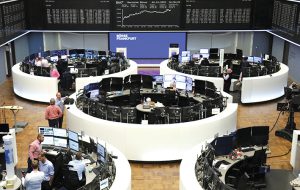BLOOMBERG
The euro retreated and stocks climbed as decelerating European inflation added fuel to broader rate-cut expectations that have spurred a global rally in assets this month.
The currency was trading 0.4% weaker versus the dollar after the pace of price growth in the region cooled more than expected. Ten-year bund yields were slightly lower after slipping as much as four basis points earlier as traders bet on an ever-earlier start to ECB interest-rate reductions next year. The Stoxx 600 index climbed 0.3%, adding to its best month since January.
Meanwhile, US Treasuries paused their November rally as traders awaited further signs on the timing of a possible pivot to rate cuts next year. Easing inflation and signs of a softer-than-expected slowdown in the US economy sent Treasuries, agency and mortgage debt to their best month since the 1980s — triggering a November bounce that pulled along assets from stocks to credit to emerging markets.
Data due on Thursday was forecast to show the Fed’s preferred inflation metric — the personal consumption expenditures price index — decelerated in October to the slowest annual rate since 2021. “Momentum on the other side of the pond is likely to remain bullish rates,” wrote Evelyne Gomez-Liechti, a multi-asset strategist at Mizuho International Plc in London. “The PCE inflation data for October is most likely going to echo what we already saw in the October CPI and PPI reports and add to the soft-landing narrative.”
Euro-zone consumer prices rose 2.4% from a year ago in November, less than the estimates of all economists in a Bloomberg poll. The numbers came after French data showed the economy shrank by 0.1% and inflation eased.
Markets now show a quarter-point reduction in ECB rates is fully priced by April, even after policymakers warned that borrowing costs will remain elevated for an
extended period. US data provided support for a soft landing for the US economy. Economic activity slowed in recent weeks as consumers pulled back on discretionary spending, the Fed said in its latest “Beige Book.”
 The Gulf Time Newspaper One of the finest business newspapers in the UAE brought to you by our professional writers and editors.
The Gulf Time Newspaper One of the finest business newspapers in the UAE brought to you by our professional writers and editors.
